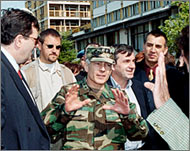Profile: Wesley Clark
A former NATO commander who has never held a political post, General Wesley Clark was one of the Democrat front runners before quitting the race to pick a presidential nominee in February.

Based in Arkansas, the former Oxford Univeristy Rhodes scholar joined the race late to run as an outsider: a carbon copy of Bill Clinton. But his image is a lot more clean-cut.
The handsome Clark has enjoyed certain advantages over his presidential rivals. His diverse background – born in Chicago in the north to a Jewish father, he moved south to be raised a Baptist before converting to Catholicism – holds appeal for some.
But the ace in his pack has been his impressive military record. His opposition to the Iraq war is bullet-proof against traditional Republican claims of Democrat weakness on defence and security affairs because Clark is a decorated war hero.
Curriculum vitae
Wesley Kanne Clark grew up in Little Rock, Arkansas, where he lives today. He graduated top of his class at the military academy at West Point in 1966.
| Wesley Clark Age: 59 |
Serving 34 years in the US Army, Clark was shot and wounded while in Vietnam. He won various military honours during his career, including the Silver Star, Bronze Star, Purple Heart, and the Presidential Medal of Freedom.
Rising to the rank of four-star general, Clark served as commander in chief of the US Southern Command from 1996 to 1997, covering in Latin America and the Caribbean. He also led military negotiations for the Bosnian Peace Accords at Dayton, Ohio, in 1995.
He finished his military career as Supreme Allied Commander of NATO from 1997-2000. As such, he oversaw the NATO mission in Kosovo and the controversial bombing of Serbia in 1999.
After retiring from the army, he joined the Arkansas-based Stephens Group as a corporate consultant before launching his own strategic advisory and consulting firm, Wesley K Clark & Associates. In 2003, he worked as a military analyst for CNN and became chairman of Wave Crest laboratories, a Virginia-based technology company.
Political agenda
Though Clark has no political experience, he says his military career has given him expertise in leadership, national security and foreign affairs.
Clark is broadly liberal: he is pro-abortion (a highly controversial issue in the US), appears to favour more gun controls, has voiced unease about the death penalty and criticised Bush’s fiscal policies.
“For the past three years, President Bush’s economic policy has been little more than reckless tax cuts for the wealthiest Americans and corporate loopholes for special interests,” Clark says.
He has also criticised increased domestic security for eroding civil liberties, saying Arab-Americans have suffered from racial profiling.
Iraq war
Clark was against invading Iraq on the grounds that the war was launched under “false pretences” – though he did make contradictory remarks about the depth of his opposition.
 |
|
Past challenges: Clark (C) in the |
The former soldier frequently criticised the Bush administration for exaggerating the threat Saddam Hussein’s regime posed. He says a pre-emptive attack was justified only if it could be shown that an imminent attack on the US or its allies was being planned.
But he says that now US troops are occupying Iraq, they cannot pull out until the country is back on its feet.
Foreign affairs
Clark believes the Bush administration wasted international sympathy and goodwill after the 11 September 2001 attacks by pursuing an aggressively unilateral approach to international relations.
By working with the United Nations more closely, Clark says the US would have earned greater legitimacy and stronger international support, especially in the Muslim world, for its campaign against Saddam Hussein and groups such as al-Qaida.
Supporters say
“I endorse him because I think he’s a great guy … He has a good handle on foreign policy”
– Madonna, singer
Critics say
“A flip-flopping, liberal Clinton crony with a penchant for whoppers and poor foreign policy decisions”
– The Republican National Committee website
Clark has sometimes seemed uncertain and error-prone. He told journalists the day after declaring his candidacy he “probably” would have voted for the Iraq war resolution, having previously portrayed himself as opposed to the invasion.
He has also gained a reputation as a headstrong leader who has had trouble working with others. Despite achieving US aims in the Kosovo conflict, Clark was controversially relieved of his command after reported clashes with his superiors.